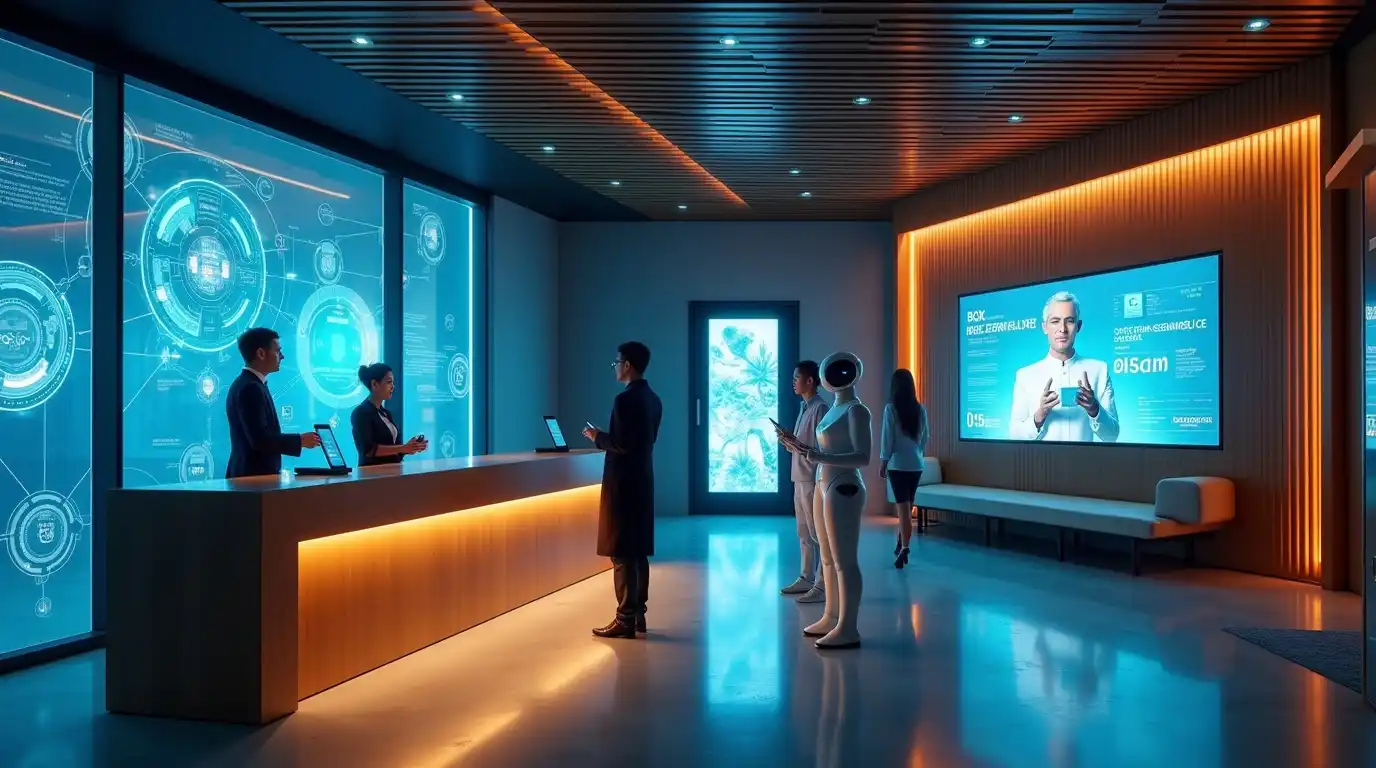Imagine this: you walk into a hotel lobby, skip the front desk, and head straight to your room. The door unlocks with your phone. Inside, the lights and temperature are just how you like them. The TV flashes a welcome message and suggests dinner at the Italian restaurant downstairs—your favourite cuisine.
This isn’t science fiction. This is what hotels powered by AI and Smart Property Management Systems (Smart PMS) look like—and it’s already happening.
What Exactly Is a Smart PMS?
Think of a Smart PMS as the hotel’s brain. Older systems only handled bookings and billing. The 2025 version is much more powerful:
- The Hub: It brings together reservations, housekeeping, billing, and guest communication on one platform.
- Always On: Because it’s cloud-based, staff can access it anytime, anywhere.
- Open & Connected: It links with other hotel systems—like revenue management tools or smart room controls—so all data flows in one place.
Without it, AI is just a buzzword. With it, hotels become smarter, faster, and more guest-friendly.
Goodbye Check-In Queues

One of the biggest visible changes? No more long lines at the front desk.
AI makes check-in faster and smoother:
- Mobile check-in: Guests complete everything on their phones before arriving. What used to take 10 minutes now takes 2–3.
- Self-service kiosks: For those who prefer an on-site option, kiosks can print keys and even suggest upgrades.
- Digital keys: Guests get a secure key on their phone and go straight to their room.
Hotels using this tech have reduced front desk workload by over 60%. That means staff spend less time on paperwork and more time actually helping guests.
Takeaway: The front desk isn’t disappearing—it’s changing. Staff are now becoming “hosts” or “experience managers,” focusing on personal connections, not paperwork.
Discover how Canary Technologies is making hotel arrivals seamless with contactless check-in solutions.
Learn more about their tools that let guests skip the front desk and head straight to their room: Contactless Check-In
How AI Finds the Perfect Price
While guests notice faster check-ins, the real magic (and money) happens behind the scenes.
AI-powered revenue systems constantly adjust room prices based on:
- Local events and demand
- Competitor prices
- Guest booking behavior
Instead of setting static seasonal rates, AI makes tiny price changes every few minutes to maximize bookings and revenue. Hotels using it have seen revenue rise by 5% or more almost instantly.
24/7 Guest Support on Your Phone
Guests no longer need to call the front desk for every little request. AI-powered chatbots on WhatsApp, SMS, or hotel apps are now available 24/7.
These bots can:
- Speak in over 100 languages
- Handle common requests instantly (extra towels, room service, late checkout)
- Suggest upsells like spa packages or dinner offers
For example, Revinate’s AI assistant “Ivy” answers most guest questions in under 2 seconds.
The Big Question: Jobs at Risk?
With all this automation, it’s natural to ask—will AI replace hotel jobs?
Experts believe the answer is no. Instead of replacing people, AI is shifting what they do:
- At risk: Routine tasks like check-in, data entry, or basic calls.
- In demand: Roles that require empathy, problem-solving, and creativity.
In fact, in a world where machines handle the boring stuff, the human touch becomes the ultimate luxury.
Pitfalls Hotels Must Avoid
- Too much automation: Guests still want humans for complex problems.
- Data risks: Mishandling guest information could destroy trust.
- Poor staff training: AI tools fail without people who know how to use them.
Case Study: IHG Smart Rooms
InterContinental Hotels Group tested AI-powered smart rooms with voice assistants. Guests could control lights, temperature, and room service with a simple voice command.
Results:
- 35% fewer routine calls to the front desk
- 30% faster housekeeping responses
- Higher guest satisfaction
- More revenue from upsell offers
The Future: Replace or Empower?
The future isn’t about hotels without people. It’s about hotels where technology does the heavy lifting so humans can focus on the magic—empathy, service, and experience.
By 2026, the hospitality AI market is expected to pass $1.2 billion, proving this shift is permanent. The hotels that succeed will balance efficiency through AI with warmth through people.
How Students & Professionals Can Stay Relevant
- Build empathy: Machines can’t comfort a guest after a long flight—you can.
- Learn to read data: You don’t need to code, but you must understand what the numbers mean.
- Think critically: Question AI suggestions, don’t just follow them blindly.
- Keep learning: New tech is always coming—stay curious.
- Create experiences: Focus on moments that guests remember long after checkout.
✅ Bottom line: AI isn’t taking over hotels—it’s reshaping them. The front desk as we know it may fade, but the need for human warmth is stronger than ever. The winners will be hotels (and professionals) who master the partnership between machine efficiency and human hospitality.
Related Articles:
- Wine Service Procedure in Restaurants: A Detailed Step-by-Step Guide
- What Are the Different Types of Cooking Methods? Explained with Examples
- Types of Food and Beverage Service: A Complete Guide for the Hospitality
- Sequence of Service in Restaurants: Steps of Table Service in Fine Dining
- Room Service in Hotels Explained: A Complete Guide
This article was written by Saswata Banerjee, the creator of Food and Beverage Service Knowledge, based on 8+ years of experience in the hospitality industry.


